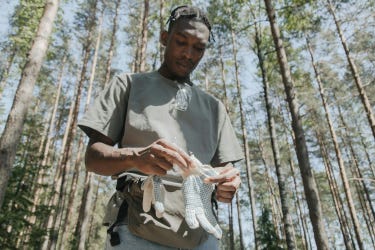Re-scripting our Realities: The Natural Lessons of Liberation
A Provocations Article by Maati Wafford
“I believe nature offers abundant displays of order and clear lessons for how to achieve it. Despite the experiences of fluctuations and changes that disrupt our plans, the world is inherently orderly. It continues to create systems of great scope, capacity, and diversity. And fluctuation and change are essential to the process by which order is created.”
-Margaret Wheatley
Just Nature
Nature serves as our blueprint, whereby we come into direct contact with the intelligence that exists all around and within us. Whether it's the moon or menstrual cycles, plant life, photosynthesis, the cadence of bird flight patterns, or a beating heart, all of these illustrate the integral nature of balance and justice that is the foundation of our reality.
Our bodies are comprised of several systems, all interconnected and interdependent, working together to help us stand upright, eat, breathe, process food, think, and more. By observing nature and human behavior, we can identify patterns that create structures that ultimately support us, our commitments, and collaborations on this planet.
Equity integration is a term used to describe the process and outcome of ensuring that those who need the most help receive the most assistance. In other words, you do the work of equity integration to achieve equity integration. Ideally, in all areas of our lives and across all the systems, we should continually ask, "Whose needs aren’t being met here? And what inequity is at the core?"—whether in a school, hospital, courtroom, etc. From there, we work to empower people to meet their needs.
What do trees teach us about justice?
As we make genuine attempts to live and behave in ways that center on equity integration, we learn that it requires an ongoing commitment to self-reflection, tapping into our imagination and deep desires, and consenting to being undone and, in some cases, rebuilt anew. But why the need to come undone?
For Montessori educators, we participate in a pedagogy deeply rooted in human behavior that uplifts the unique sensitivities of its learners, and living in a just and safe world is crucial. For children to adapt to their environments with their psychic integrity intact, adults must be able to model what it means to be in right relationship with themselves, others, and the planet. This may be difficult and may require a great deal of unlearning and undoing.
Much of nature happens in very slow, subtle ways, and much of it goes unnoticed. Additionally, many people, quite frankly, are living in a state of fear, and when that's the case, our brains and emotions get hijacked, and we miss the quiet unfolding.
Embodiment allows us to tune into the subtleties. Awareness and alignment are heightened when we practice being proximate to our senses and physical environments.
According to forester and author of the book The Hidden Life of Trees, Peter Wohlleben (2017), an advocate for a forest ethic, which allows trees to live undisturbed and free from human destruction, maintains that trees are social beings; they care for one another and warn their neighbors of impending danger. They function as protective factors for other trees that are in various states of decay and dying. Although this system is activated every day right before our eyes, many of us are distracted from recognizing it as such and therefore fail to understand the just nature of our realities and the integral roles we all play in these ecosystems.
In the novel Beloved, by Toni Morrison, there is a powerful scene that speaks to the sacredness of the forest. In the book, Morrison describes a forest clearing where members of a community gather to restore themselves as they grapple with living in a world of oppression and violence. A clearing, by definition, is a place in nature, an open space in a forest, especially one cleared for cultivation. In the novel, the clearing is transformed into a sacred, communal space that is energetically prepared and used to inspire and heal.
This all happens through embodiment. The author goes on to describe the leader commanding the group to use their physical bodies and senses as portals for survival. The scene illustrates an intergenerational coming together, where spiritual and physical alignment are achieved through an embodied practice that involves movement, sensory awareness, and nature.
One might go so far as to imagine the forest as a prepared environment where social beings, whether trees or people, lived in a community of care, where they warned their neighbors of impending danger and provided protection.
In this way, we begin to understand a more integral relationship between social justice, nature, and embodiment. As we commit to and seek out deeper connections with the ordered nature around us, we learn to identify and undo societal chaos and internal systems that sever our intuition. Recommitting to the balance and justice we observe in nature and by extension ourselves, lays the foundation for creating sustainable frameworks that rebuild and restore our psyches and broader systems.
Rescripting our Realities
“To be truly visionary, we have to root our imagination in our concrete reality while simultaneously imagining possibilities beyond that reality.”
bell hooks (2014). Feminism Is for Everybody: Passionate Politics, p.110
Imagine systems-level change in education and society unfolding with each breath we take. The fluid nature of imagination offers us a breath of fresh air and expansiveness as we navigate rigid systems of inequity. To rescript and transform our realities, it's critical to remain aware of our tendency to revert to familiar patterns while also staying open to new ways of being.
“The first step an intending Montessori teacher must take is to prepare herself. For one thing, she must keep her imagination alive; ... the Montessori teacher is constantly looking for a child who is not yet there. ”
Maria Montessori, The Absorbent Mind, p. 252
Centering the role of imagination in our advocacy work helps us strike a healthy balance between structure and flow, analysis and intuition, service and surrender. The skill of seeking something that is not yet there requires a level of insight, faith, and a keen sense of justice. When educators and leaders use self-reflection and radical imagining, we train ourselves to envision solutions and, more importantly, to get out of the way when it is revealed that we are part of the problem. Rescripting outdated stories and negative patterns of human behavior and human condition prepares us to revolutionize our understanding of reality.
“Adults must defend children. We adults must see the real humanity in children, the humanity which will take our place one day, if we are to have social progress. Social progress means that the next generation is better than the one before.”
Maria Montessori, The 1946 London Lectures, p. 140
A primary goal of the Montessori movement is to provide an education capable of saving humanity. For us to do this, we must be able and ready to defend children. We can espouse these ideals intellectually and publicly perform this narrative. Such ideals are beautiful to reflect upon, but how do we get to that place of being? Transforming realities is as much about who we are as it is about what we do.
Ultimately, we will protect that which we find ourselves most connected to. It is more than what we learn in teacher education programs or what we simply envision ourselves to be; it's about who we are at our core as people and how effective we are in leading from that place.
For many of us, these lofty expectations fuel privileged ways of thinking about ourselves and work. If we are not careful and critical, we fall into self-fulfilling cycles of martyrdom. Before shouting from the rooftops, it's our job to “bring Montessori” to people whom we deem as needy or marginalized; we should first work to be the self-reflecting, spiritually prepared adults we are asked to be when no one is watching.
Lofty quotes about Montessori pedagogy and the spiritual preparation of the teacher don’t make us good… It’s literally what makes this work hard!
Again, I ask, why is it necessary to defend the child?
When we chose Montessori, we took on the responsibility of caring for other people's children, of holding space for them. To keep such a space and create liberatory clearings for all children, we must first imagine those spaces from within.
Consent and Critical Consciousness
When we give consent, we grant access and permit something to happen. We live in a society where many of us are shamed and socialized right out of our authenticity and sovereignty.
Emotions like anger, rage, or resistance, which are all core aspects of our humanity and life force energy, are often demonized; we tuck them away for fear of being labeled angry, toxic, not ladylike, or that they would somehow cause harm to others or force others to experience discomfort or stress.
Meanwhile, we are rendered useless, detached from our own experiences and our bodies, our navigational tool becomes skewed- we lose our connection to it and therefore our selfhood. If we aren’t living in our bodies, we likely miss out on opportunities to transform our realities.
Just as Montessori demands that Montessori educators be like scientists and, at the same time, like saints, we all know that's a tall order. Our world requires critical consciousness now more than ever, so that we all commit to self-refinement and challenge our own thoughts and belief patterns in a way that allows us to consider the humanity of all.
If we resist this calling, we essentially become the source of our self-torment...I encourage you to heed the call and work explicitly towards the liberation of our children. As Montessori says, it is our task to help them to save humanity.
In an attempt to teach and lead in a society that often seems hell bent on taking us out, we still somehow find it in our hearts to show up and give our best anyway. But how and at what cost? We have desires, we have needs, and creativity inside that requires us to do and see something more expansive. When we consent to sift through the muck within ourselves, we reach the clarity that comes from letting go. It takes a certain degree of awareness to accept how we need to be undone, how we need to unlearn societal messages that keep us from ourselves and each other.
We all need to become undone.
Let’s call for a do-over today.
Maati Wafford is a licensed social worker, equity practitioner, and spirit-led credentialed Montessori leader (Early Childhood, Lower El, Upper El, Administrator). For over 15 years, Maati has served Montessori, public, and independent school communities by creating innovative spaces for learning organizations and individuals to expand, build, and create more justice in the world. She firmly believes in divine intelligence and understands that we all sit at the very center of that space.
Special thanks to Maati for her Provocations contribution! If you want to check out more of Maati’s work, you can find it at Willed Radiance!





